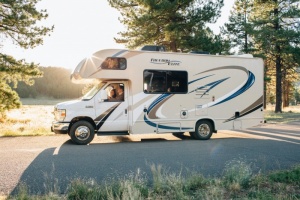So you bought an RV…now what? 5 tips for new RV owners

Traveling RV is an immensely flexible way to visit our country’s backroads and byways, as well as its most spectacular spots. The usage of RVs for other purposes such as guest cottages, home offices, tailgating and day trips are also possible. When you purchase an RV, the adventure really begins on the first day, but the learning curve begins immediately as well. A recreational vehicle (RV) may be owned and operated by anyone–but there are a lot of things to learn along the way.
Listed here are 5 fast recommendations as well as must have RV accessories for the first-time RV owners that will assist you in overcoming the learning curve and taking your place around the campfire beneath a sky filled with beautiful stars.
1. Put your knowledge into action.
Before you leave home, make sure you are comfortable with your RV and all of its systems. Slideouts should be moved in and out, the RV should be leveled, jacks should be deployed, the tow vehicle or dinghy should be hitched and unhitched, and the external signal lights should be checked.
Practice driving the RV and backing it up as well. Keep in mind that if you can park your RV next to or in front of your house, you should spend your first-night “camping” at home! Prepare meals, shower, sleep, crank up the heat, rain, brush your teeth, and so on while spending the day in and around your RV conducting your typical daily routine.
2. Make a Checklist of everything you need to do
During your practice sessions with your RV at home, make checklists for the goods to pack, how to set up camp, and when to leave. This is an excellent starting point for developing your lists. As you arrive at the campground, there is a lot to keep in mind when setting up your campsite for the first time. The following are some crucial points.
● Squeeze the brakes.
● If necessary, disconnect the tow vehicle or dinghy from the shore.
● Extend the number of stairs leading up to the front entrance.
● Connect to a power source such as a wall outlet. You may need to switch on the circuit breaker after plugging in.
● Increase the length of the slide-outs.
● Turn on any appliances that may not be running at the time, such as the water heater.
3. Make a plan.
While you are most likely thrilled to go on your first RV vacation, you should set aside some time to prepare in advance. Make a plan for where you’re going, what route is ideal for your RV, if reservations are necessary when check-in time will be, what services will be available, how long it will take to get there, and whether any special permissions are required to camp or recreation, among other things. It is strongly suggested that your first camping trip take place within a short drive of your house.
This will enable you to arrive at the campsite without feeling rushed, let you set up camp with plenty of daylight, and give you additional time to deal with any problems that may arise. The first time you go camping, treat yourself to a reserved campground with all of the amenities.
4. Arriving at the Campground
Be sure to note the address or physical location of the campsite entrance, as well as the location of the registration office, since many campgrounds and RV parks have one. Likewise, knowing where your campground is situated concerning the office can help you understand where you need to go once you’ve checked in, which will save you time later on.
Even if you are supplied with a map of the campsite, it is recommended that you spend some time before check-in memorizing the layout and roads of the park to prevent making an expensive and humiliating navigation blunder that might result in a fine or worse. It is essential to understand the layout of your campground concerning the access road so that you may arrive at it appropriately, locate the utility connections, and place your RV in the available area to deploy the slide-outs.
5. Campground Etiquette
While the whole family is certainly looking forward to their first RV camping trip at a park, they should keep in mind that they will have neighbors. Other campers should be respected in the following areas: noise trespassing on their space, dogs, campfire smoke, and personal privacy since most of them are in place to make the camping experience more enjoyable for everyone. As a bonus, here is an enlarged list of things not to do while trying to be a responsible campsite neighbor.
Conclusion
If you are just getting started on your RVing trip, we wish you the best of success and all of the pleasures and benefits that come with being on the open road. Adventure is waiting for you, and the RV of your dreams is only around the corner. We hope you can get your hands on them both.

